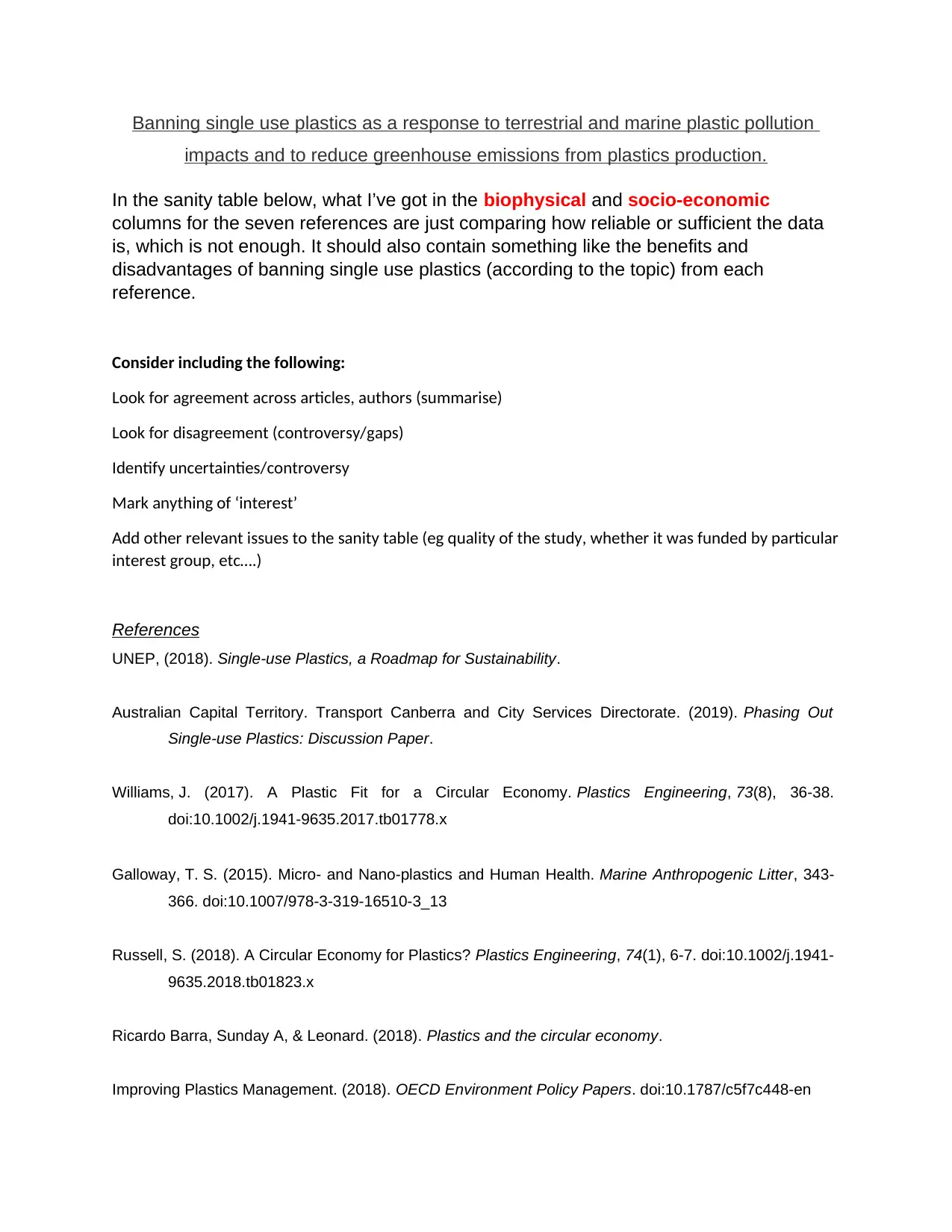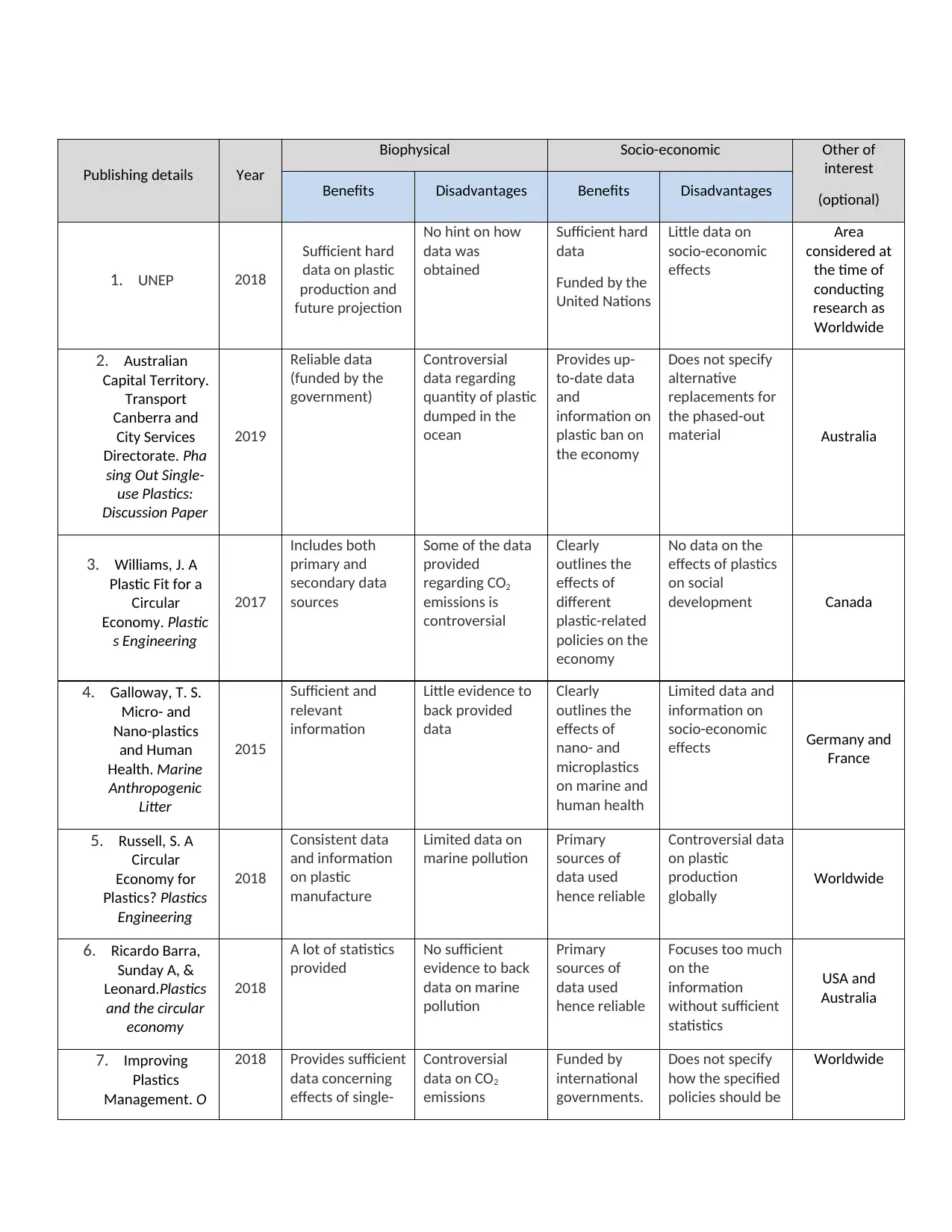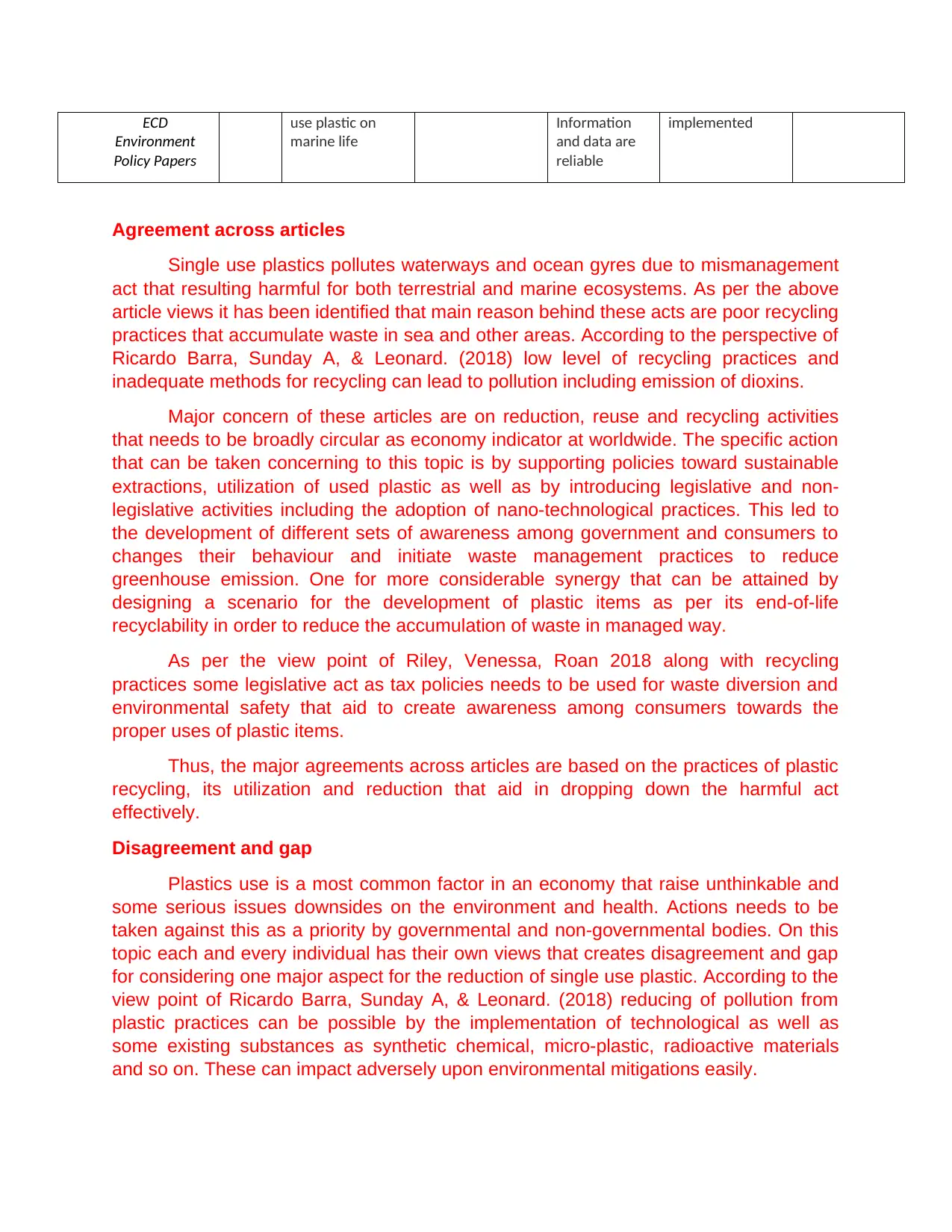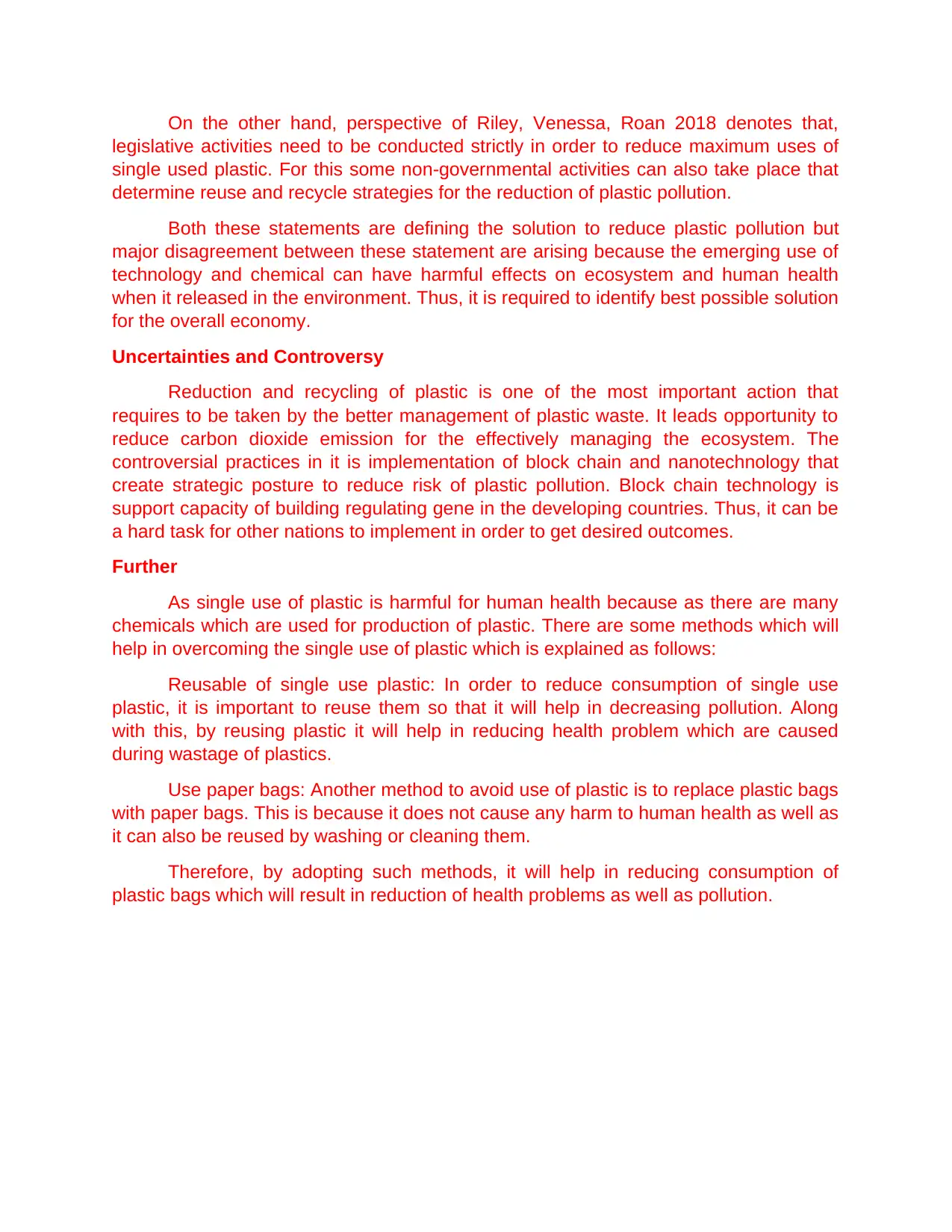Assignment on Single-Use Plastics
VerifiedAdded on 2021/02/19
|4
|1442
|24
AI Summary
Contribute Materials
Your contribution can guide someone’s learning journey. Share your
documents today.

Banning single use plastics as a response to terrestrial and marine plastic pollution
impacts and to reduce greenhouse emissions from plastics production.
In the sanity table below, what I’ve got in the biophysical and socio-economic
columns for the seven references are just comparing how reliable or sufficient the data
is, which is not enough. It should also contain something like the benefits and
disadvantages of banning single use plastics (according to the topic) from each
reference.
Consider including the following:
Look for agreement across articles, authors (summarise)
Look for disagreement (controversy/gaps)
Identify uncertainties/controversy
Mark anything of ‘interest’
Add other relevant issues to the sanity table (eg quality of the study, whether it was funded by particular
interest group, etc….)
References
UNEP, (2018). Single-use Plastics, a Roadmap for Sustainability.
Australian Capital Territory. Transport Canberra and City Services Directorate. (2019). Phasing Out
Single-use Plastics: Discussion Paper.
Williams, J. (2017). A Plastic Fit for a Circular Economy. Plastics Engineering, 73(8), 36-38.
doi:10.1002/j.1941-9635.2017.tb01778.x
Galloway, T. S. (2015). Micro- and Nano-plastics and Human Health. Marine Anthropogenic Litter, 343-
366. doi:10.1007/978-3-319-16510-3_13
Russell, S. (2018). A Circular Economy for Plastics? Plastics Engineering, 74(1), 6-7. doi:10.1002/j.1941-
9635.2018.tb01823.x
Ricardo Barra, Sunday A, & Leonard. (2018). Plastics and the circular economy.
Improving Plastics Management. (2018). OECD Environment Policy Papers. doi:10.1787/c5f7c448-en
impacts and to reduce greenhouse emissions from plastics production.
In the sanity table below, what I’ve got in the biophysical and socio-economic
columns for the seven references are just comparing how reliable or sufficient the data
is, which is not enough. It should also contain something like the benefits and
disadvantages of banning single use plastics (according to the topic) from each
reference.
Consider including the following:
Look for agreement across articles, authors (summarise)
Look for disagreement (controversy/gaps)
Identify uncertainties/controversy
Mark anything of ‘interest’
Add other relevant issues to the sanity table (eg quality of the study, whether it was funded by particular
interest group, etc….)
References
UNEP, (2018). Single-use Plastics, a Roadmap for Sustainability.
Australian Capital Territory. Transport Canberra and City Services Directorate. (2019). Phasing Out
Single-use Plastics: Discussion Paper.
Williams, J. (2017). A Plastic Fit for a Circular Economy. Plastics Engineering, 73(8), 36-38.
doi:10.1002/j.1941-9635.2017.tb01778.x
Galloway, T. S. (2015). Micro- and Nano-plastics and Human Health. Marine Anthropogenic Litter, 343-
366. doi:10.1007/978-3-319-16510-3_13
Russell, S. (2018). A Circular Economy for Plastics? Plastics Engineering, 74(1), 6-7. doi:10.1002/j.1941-
9635.2018.tb01823.x
Ricardo Barra, Sunday A, & Leonard. (2018). Plastics and the circular economy.
Improving Plastics Management. (2018). OECD Environment Policy Papers. doi:10.1787/c5f7c448-en
Secure Best Marks with AI Grader
Need help grading? Try our AI Grader for instant feedback on your assignments.

Publishing details Year
Biophysical Socio-economic Other of
interest
(optional)
Benefits Disadvantages Benefits Disadvantages
1. UNEP 2018
Sufficient hard
data on plastic
production and
future projection
No hint on how
data was
obtained
Sufficient hard
data
Funded by the
United Nations
Little data on
socio-economic
effects
Area
considered at
the time of
conducting
research as
Worldwide
2. Australian
Capital Territory.
Transport
Canberra and
City Services
Directorate. Pha
sing Out Single-
use Plastics:
Discussion Paper
2019
Reliable data
(funded by the
government)
Controversial
data regarding
quantity of plastic
dumped in the
ocean
Provides up-
to-date data
and
information on
plastic ban on
the economy
Does not specify
alternative
replacements for
the phased-out
material Australia
3. Williams, J. A
Plastic Fit for a
Circular
Economy. Plastic
s Engineering
2017
Includes both
primary and
secondary data
sources
Some of the data
provided
regarding CO2
emissions is
controversial
Clearly
outlines the
effects of
different
plastic-related
policies on the
economy
No data on the
effects of plastics
on social
development Canada
4. Galloway, T. S.
Micro- and
Nano-plastics
and Human
Health. Marine
Anthropogenic
Litter
2015
Sufficient and
relevant
information
Little evidence to
back provided
data
Clearly
outlines the
effects of
nano- and
microplastics
on marine and
human health
Limited data and
information on
socio-economic
effects Germany and
France
5. Russell, S. A
Circular
Economy for
Plastics? Plastics
Engineering
2018
Consistent data
and information
on plastic
manufacture
Limited data on
marine pollution
Primary
sources of
data used
hence reliable
Controversial data
on plastic
production
globally
Worldwide
6. Ricardo Barra,
Sunday A, &
Leonard.Plastics
and the circular
economy
2018
A lot of statistics
provided
No sufficient
evidence to back
data on marine
pollution
Primary
sources of
data used
hence reliable
Focuses too much
on the
information
without sufficient
statistics
USA and
Australia
7. Improving
Plastics
Management. O
2018 Provides sufficient
data concerning
effects of single-
Controversial
data on CO2
emissions
Funded by
international
governments.
Does not specify
how the specified
policies should be
Worldwide
Biophysical Socio-economic Other of
interest
(optional)
Benefits Disadvantages Benefits Disadvantages
1. UNEP 2018
Sufficient hard
data on plastic
production and
future projection
No hint on how
data was
obtained
Sufficient hard
data
Funded by the
United Nations
Little data on
socio-economic
effects
Area
considered at
the time of
conducting
research as
Worldwide
2. Australian
Capital Territory.
Transport
Canberra and
City Services
Directorate. Pha
sing Out Single-
use Plastics:
Discussion Paper
2019
Reliable data
(funded by the
government)
Controversial
data regarding
quantity of plastic
dumped in the
ocean
Provides up-
to-date data
and
information on
plastic ban on
the economy
Does not specify
alternative
replacements for
the phased-out
material Australia
3. Williams, J. A
Plastic Fit for a
Circular
Economy. Plastic
s Engineering
2017
Includes both
primary and
secondary data
sources
Some of the data
provided
regarding CO2
emissions is
controversial
Clearly
outlines the
effects of
different
plastic-related
policies on the
economy
No data on the
effects of plastics
on social
development Canada
4. Galloway, T. S.
Micro- and
Nano-plastics
and Human
Health. Marine
Anthropogenic
Litter
2015
Sufficient and
relevant
information
Little evidence to
back provided
data
Clearly
outlines the
effects of
nano- and
microplastics
on marine and
human health
Limited data and
information on
socio-economic
effects Germany and
France
5. Russell, S. A
Circular
Economy for
Plastics? Plastics
Engineering
2018
Consistent data
and information
on plastic
manufacture
Limited data on
marine pollution
Primary
sources of
data used
hence reliable
Controversial data
on plastic
production
globally
Worldwide
6. Ricardo Barra,
Sunday A, &
Leonard.Plastics
and the circular
economy
2018
A lot of statistics
provided
No sufficient
evidence to back
data on marine
pollution
Primary
sources of
data used
hence reliable
Focuses too much
on the
information
without sufficient
statistics
USA and
Australia
7. Improving
Plastics
Management. O
2018 Provides sufficient
data concerning
effects of single-
Controversial
data on CO2
emissions
Funded by
international
governments.
Does not specify
how the specified
policies should be
Worldwide

ECD
Environment
Policy Papers
use plastic on
marine life
Information
and data are
reliable
implemented
Agreement across articles
Single use plastics pollutes waterways and ocean gyres due to mismanagement
act that resulting harmful for both terrestrial and marine ecosystems. As per the above
article views it has been identified that main reason behind these acts are poor recycling
practices that accumulate waste in sea and other areas. According to the perspective of
Ricardo Barra, Sunday A, & Leonard. (2018) low level of recycling practices and
inadequate methods for recycling can lead to pollution including emission of dioxins.
Major concern of these articles are on reduction, reuse and recycling activities
that needs to be broadly circular as economy indicator at worldwide. The specific action
that can be taken concerning to this topic is by supporting policies toward sustainable
extractions, utilization of used plastic as well as by introducing legislative and non-
legislative activities including the adoption of nano-technological practices. This led to
the development of different sets of awareness among government and consumers to
changes their behaviour and initiate waste management practices to reduce
greenhouse emission. One for more considerable synergy that can be attained by
designing a scenario for the development of plastic items as per its end-of-life
recyclability in order to reduce the accumulation of waste in managed way.
As per the view point of Riley, Venessa, Roan 2018 along with recycling
practices some legislative act as tax policies needs to be used for waste diversion and
environmental safety that aid to create awareness among consumers towards the
proper uses of plastic items.
Thus, the major agreements across articles are based on the practices of plastic
recycling, its utilization and reduction that aid in dropping down the harmful act
effectively.
Disagreement and gap
Plastics use is a most common factor in an economy that raise unthinkable and
some serious issues downsides on the environment and health. Actions needs to be
taken against this as a priority by governmental and non-governmental bodies. On this
topic each and every individual has their own views that creates disagreement and gap
for considering one major aspect for the reduction of single use plastic. According to the
view point of Ricardo Barra, Sunday A, & Leonard. (2018) reducing of pollution from
plastic practices can be possible by the implementation of technological as well as
some existing substances as synthetic chemical, micro-plastic, radioactive materials
and so on. These can impact adversely upon environmental mitigations easily.
Environment
Policy Papers
use plastic on
marine life
Information
and data are
reliable
implemented
Agreement across articles
Single use plastics pollutes waterways and ocean gyres due to mismanagement
act that resulting harmful for both terrestrial and marine ecosystems. As per the above
article views it has been identified that main reason behind these acts are poor recycling
practices that accumulate waste in sea and other areas. According to the perspective of
Ricardo Barra, Sunday A, & Leonard. (2018) low level of recycling practices and
inadequate methods for recycling can lead to pollution including emission of dioxins.
Major concern of these articles are on reduction, reuse and recycling activities
that needs to be broadly circular as economy indicator at worldwide. The specific action
that can be taken concerning to this topic is by supporting policies toward sustainable
extractions, utilization of used plastic as well as by introducing legislative and non-
legislative activities including the adoption of nano-technological practices. This led to
the development of different sets of awareness among government and consumers to
changes their behaviour and initiate waste management practices to reduce
greenhouse emission. One for more considerable synergy that can be attained by
designing a scenario for the development of plastic items as per its end-of-life
recyclability in order to reduce the accumulation of waste in managed way.
As per the view point of Riley, Venessa, Roan 2018 along with recycling
practices some legislative act as tax policies needs to be used for waste diversion and
environmental safety that aid to create awareness among consumers towards the
proper uses of plastic items.
Thus, the major agreements across articles are based on the practices of plastic
recycling, its utilization and reduction that aid in dropping down the harmful act
effectively.
Disagreement and gap
Plastics use is a most common factor in an economy that raise unthinkable and
some serious issues downsides on the environment and health. Actions needs to be
taken against this as a priority by governmental and non-governmental bodies. On this
topic each and every individual has their own views that creates disagreement and gap
for considering one major aspect for the reduction of single use plastic. According to the
view point of Ricardo Barra, Sunday A, & Leonard. (2018) reducing of pollution from
plastic practices can be possible by the implementation of technological as well as
some existing substances as synthetic chemical, micro-plastic, radioactive materials
and so on. These can impact adversely upon environmental mitigations easily.

On the other hand, perspective of Riley, Venessa, Roan 2018 denotes that,
legislative activities need to be conducted strictly in order to reduce maximum uses of
single used plastic. For this some non-governmental activities can also take place that
determine reuse and recycle strategies for the reduction of plastic pollution.
Both these statements are defining the solution to reduce plastic pollution but
major disagreement between these statement are arising because the emerging use of
technology and chemical can have harmful effects on ecosystem and human health
when it released in the environment. Thus, it is required to identify best possible solution
for the overall economy.
Uncertainties and Controversy
Reduction and recycling of plastic is one of the most important action that
requires to be taken by the better management of plastic waste. It leads opportunity to
reduce carbon dioxide emission for the effectively managing the ecosystem. The
controversial practices in it is implementation of block chain and nanotechnology that
create strategic posture to reduce risk of plastic pollution. Block chain technology is
support capacity of building regulating gene in the developing countries. Thus, it can be
a hard task for other nations to implement in order to get desired outcomes.
Further
As single use of plastic is harmful for human health because as there are many
chemicals which are used for production of plastic. There are some methods which will
help in overcoming the single use of plastic which is explained as follows:
Reusable of single use plastic: In order to reduce consumption of single use
plastic, it is important to reuse them so that it will help in decreasing pollution. Along
with this, by reusing plastic it will help in reducing health problem which are caused
during wastage of plastics.
Use paper bags: Another method to avoid use of plastic is to replace plastic bags
with paper bags. This is because it does not cause any harm to human health as well as
it can also be reused by washing or cleaning them.
Therefore, by adopting such methods, it will help in reducing consumption of
plastic bags which will result in reduction of health problems as well as pollution.
legislative activities need to be conducted strictly in order to reduce maximum uses of
single used plastic. For this some non-governmental activities can also take place that
determine reuse and recycle strategies for the reduction of plastic pollution.
Both these statements are defining the solution to reduce plastic pollution but
major disagreement between these statement are arising because the emerging use of
technology and chemical can have harmful effects on ecosystem and human health
when it released in the environment. Thus, it is required to identify best possible solution
for the overall economy.
Uncertainties and Controversy
Reduction and recycling of plastic is one of the most important action that
requires to be taken by the better management of plastic waste. It leads opportunity to
reduce carbon dioxide emission for the effectively managing the ecosystem. The
controversial practices in it is implementation of block chain and nanotechnology that
create strategic posture to reduce risk of plastic pollution. Block chain technology is
support capacity of building regulating gene in the developing countries. Thus, it can be
a hard task for other nations to implement in order to get desired outcomes.
Further
As single use of plastic is harmful for human health because as there are many
chemicals which are used for production of plastic. There are some methods which will
help in overcoming the single use of plastic which is explained as follows:
Reusable of single use plastic: In order to reduce consumption of single use
plastic, it is important to reuse them so that it will help in decreasing pollution. Along
with this, by reusing plastic it will help in reducing health problem which are caused
during wastage of plastics.
Use paper bags: Another method to avoid use of plastic is to replace plastic bags
with paper bags. This is because it does not cause any harm to human health as well as
it can also be reused by washing or cleaning them.
Therefore, by adopting such methods, it will help in reducing consumption of
plastic bags which will result in reduction of health problems as well as pollution.
1 out of 4
Your All-in-One AI-Powered Toolkit for Academic Success.
+13062052269
info@desklib.com
Available 24*7 on WhatsApp / Email
![[object Object]](/_next/static/media/star-bottom.7253800d.svg)
Unlock your academic potential
© 2024 | Zucol Services PVT LTD | All rights reserved.